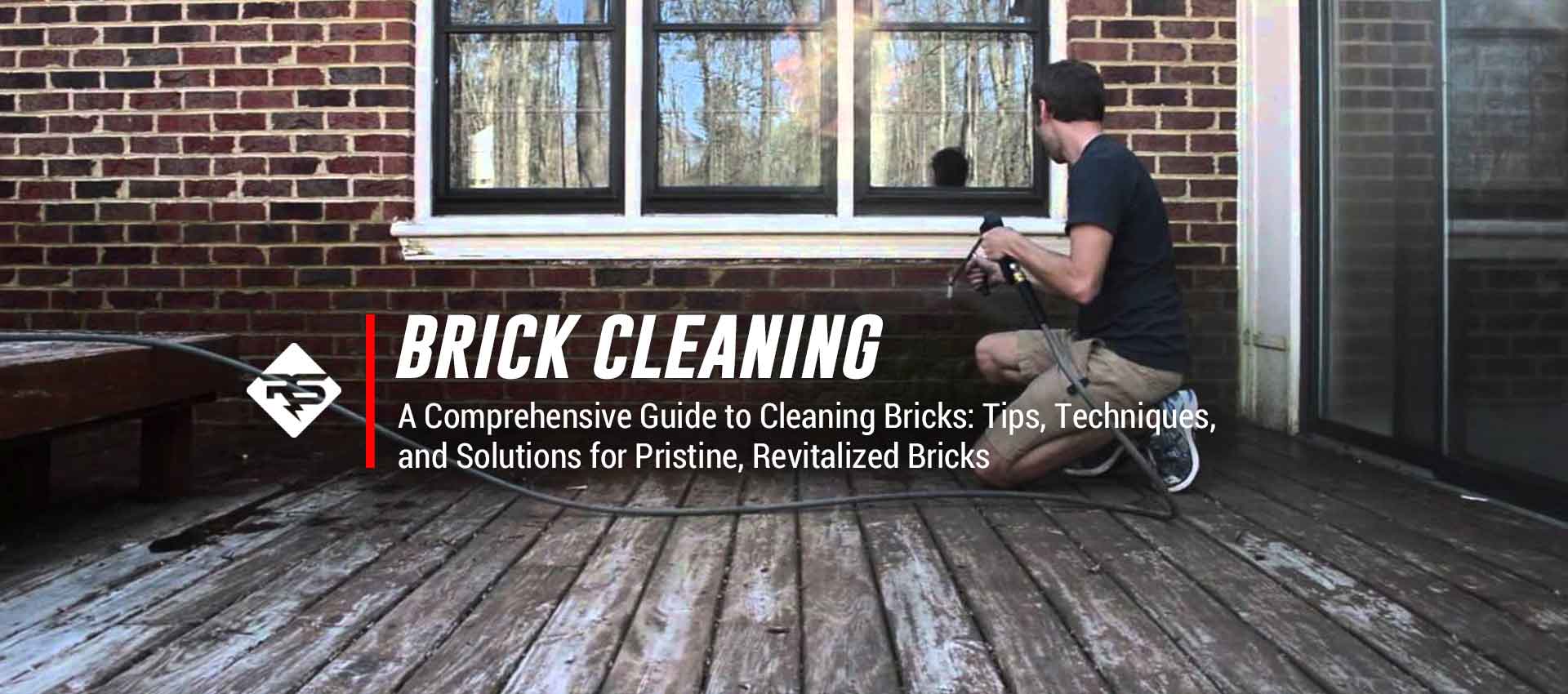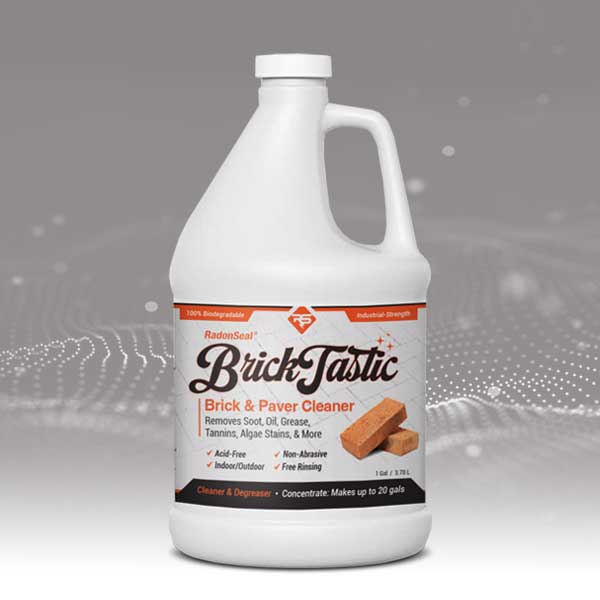Brick Cleaning: What You Need to Know
Although brick is considered a low-maintenance building material, occasional brick cleaning is needed to keep it looking its best. Picking the right brick cleaner for your project is critical to your success. Choose wisely and you will get optimal results with minimal effort and expense. Choose poorly, and you’ll be wasting valuable time and money, and may even harm the bricks or pavers.
While there is no shortage of companies that offer professional brick cleaning services, with the right brick cleaner and a little know-how, cleaning your brick home or brick paver driveway and patio, can be a successful do-it-yourself project.
How to Clean Brick the Right Way
Efflorescence, mold and algae, hard water stains, lime run, tire marks, soot, and carbon stains, are only a few of the contaminants that can make your brick surfaces dull and discolored. Regardless of the type of stain you are trying to clean, there are a few basic principles that apply regardless of the type of brick or stain you are cleaning:
- Choose Prevention When Possible: The best way to keep clean brick surfaces is to prevent them from becoming stained in the first place. Do your best to prevent the condition(s) that is causing the stain. For example, diverting sprinkler heads will prevent hard water stains from developing on brick walls. Cutting back tree limbs that overhang your driveway will reduce the frequency of leaf stains on your brick pavers. Perhaps the best way to reduce both the frequency and severity of stains is to use a high-quality brick sealer. Remember, an ounce of prevention is worth a pound of cure.
- Clean Your Brick Without Damaging it: It is important to note that cleaning brick surfaces requires a gentle approach to avoid causing damage. A “soft wash” is especially important when cleaning older brick. Aggressive scrubbing and the use of wire brushes can scratch or damage the brick face and the mortar joints. Choose soft bristle brushes, or even better, avoid scrubbing the brick entirely whenever possible.
- Protect Yourself and Your Surroundings: Be sure to understand how your brick cleaning solution can impact your health. A careful review of the brick cleaner label and safety data sheets will ensure you understand any hazards. For example, you may need to protect plants, grass, and shrubbery when cleaning exterior brick. If you are cleaning fireplace brick or other indoor brick surfaces, understanding the risks associated with breathing vapors or fumes is important. *Whenever possible, choose a brick cleaner that is non-toxic, non-flammable, and environmentally friendly.*
- Ease up on the Pressure:
While pressure washers are a handy tool for cleaning bricks, it’s important to use them with caution. Excessive pressure can damage the brick surface and cause deterioration. It’s best to start with a lower pressure setting and raise it gradually, as necessary. Most brick manufacturers advise not exceeding 800 psi, but as a rule, use the minimum pressure needed to effectively clean your brick.
-
Test First: When you do settle on a brick cleaner, conducting a test is highly recommended. Apply the cleaner to an inconspicuous area according to the instructions to verify its suitability and effectiveness.
Cleaning Brick in Cold Weather
Cold temperatures can reduce the effectiveness and reaction rate of some brick cleaners. For best results, both air and surface temperatures should be above 45°F during application and until the surface dries.
Cleaning bricks when temperatures are approaching freezing should be avoided. Because brick and mortar are porous, they readily absorb water. If the absorbed water freezes, expansive forces inside the brick will cause spalling, flaking, or structural damage to the brick.
Cleaning Brick in Hot Weather
Care should be taken to prevent your brick cleaners from drying on the brick surface. Drying times decrease significantly in hot and sunny weather. Remember, brick cleaners are only active when they are wet.
The longer the brick cleaner is allowed to “dwell” on the surface, the more effective it will be. It may be necessary to reapply the cleaner several times in hot weather to keep the surface wet and keep the cleaner working. Some brick cleaners can cause staining or streaking if they are allowed to dry before being rinsed away.
Choosing the Best Brick Cleaner: Stain Identification
Choosing a brick cleaner is a lot easier when you can identify the stain you are trying to remove. Some stains require specific cleaners and/or cleaning methods.
Stains on brick surfaces can generally be separated into two main categories: organic stains and inorganic stains. This is an important distinction, as the type of cleaner you choose needs to be formulated for the category of stain you are trying to remove.
Organic stains are the most common. Examples of common organic brick stains include:
- BBQ Grease and Cooking Oils
- Motor Oil or Synthetic Oils
- Leaf Tannins, Acorns, and Tree Sap
- Tire Marks
- Mold and Algae Stains
Organic stains are best removed using butyl-based cleaners and degreasers. Butyl-based brick cleaners are specialized cleaning solutions formulated with butyl solvent, a nonpolar organic compound known for effective stain removal and exceptional degreasing capabilities
Examples of inorganic stains include:
- Efflorescence
- Rust
- Hard Water Deposits
- Lime Run
- Mortar Smears
- Red Clay
Inorganic stains are best removed using an acidic or low-pH cleaner. Acid-based brick cleaners (including new acid-free low pH alternatives) effectively remove both mineral and metal stains from brick surfaces by disrupting the molecular bonds of the stain particles and converting them into soluble salts.
The Only Brick Cleaners You Need
With over 25 years of experience in brick restoration and preservation, our brick cleaners are trusted by architects, builders, and homeowners. Powerful, versatile, and budget-friendly formulas that can be used safely on interior brock and outdoor brick. It doesn’t matter what type of stain you have or what type of brick you have, we have the cleaning solution for you.
BEST ALL AROUND BRICK CLEANER
BrickTastic – A multipurpose, butyl-based, brick and paver cleaner and degreaser.
A true “jack-of-all-trades” brick cleaner. BrickTastic is a concentrated blend of butyl solvents and surfactants. A powerful stain remover that is safe for all brick surfaces. Non-corrosive and non-abrasive. For use on brick walls and hardscaping, brick homes, chimney brick, brick fireplaces, brick patios and driveways, and more.
Simply dilute with water to match the severity of cleaning. BrickTastic is effective on a wide variety of stains commonly found on brick surfaces including mold and algae stains, leaf stains, oils and engine fluids, tire marks, soot, pine sap, and more. Low-foaming action makes BrickTastic perfect for scrubbers and pressure washers.
BEST EFFLORESCENCE REMOVER
RadonSeal Efflorescence Remover – A powerful, yet safe, liquid-applied cleaner for removing efflorescence, rust, and other mineral stains from brick surfaces.
Need the cleaning power of a strong acid, but not the choking fumes, stinging eyes, and other hazards? RadonSeal Efflorescence Cleaner is an advanced, acid-free, low-pH cleaner that makes quick work of salt or mineral stains without the risk of burning or damaging brick or mortar. Safe for people, plants, and pets, it can be used indoors where traditional acids cannot.
BEST RED CLAY STAIN REMOVER
Clay-X Red Clay Stain Remover – A professional-strength cleaner designed specifically for tough red clay, rust, and iron oxide stains on brick and masonry.
Unlike general-purpose cleaners, Clay-X is a targeted solution that penetrates deep into porous brick to break down and dissolve red clay deposits that ordinary cleaners can’t touch. Fast-acting, non-toxic, and non-flammable, it’s safe for use on brick homes, patios, walls, chimneys, pavers, and other masonry surfaces. Clay-X delivers professional results without the harsh fumes of muriatic acid, making it a safer choice for both homeowners and contractors.
BrickTastic Brick & Paver Cleaner
Buy Now
Efflorescence Cleaner
Buy Now
Cleaning Bricks with Muriatic Acid?
Is it safe to clean bricks with muriatic acid? The short answer is no. While muriatic acid will remove many stains, it can damage or stain brick and mortar if used incorrectly or too frequently. Additionally, using muriatic acid, or phosphoric acid, can be dangerous and must be handled properly to avoid injuries to your skin and eyes. Muriatic acid fumes are toxic and can cause asthma-like symptoms or difficulty breathing. Using muriatic brick acid indoors or in confined spaces is never a good idea.
The good news is, that a new generation of acid-free, low-pH cleaners have replaced muriatic acid cleaners. Formulated with mineral salts rather than acid, these cleaners pack the punch of muriatic acid without the safety hazards. Non-corrosive to skin and non-fuming, they are safe for both interior brick and outdoor brick.
Two of the best muriatic acid cleaner alternatives are RadonSeal Efflorescence Cleaner and PowerEtch Concrete Etcher & Cleaner.
Prevent Stains by Sealing Your Bricks and Pavers
Now that you have your bricks or pavers looking great, don’t let your hard work go to waste. Sealing your brick with LastiSeal Brick & Concrete Sealer after using Brick Magic Cleaner is a great idea for several reasons. Not only will it help to maintain the clean, refreshed look of your brick, but it will also protect against future staining and damage. Here are a few key benefits to consider:
- Long-lasting protection: LastiSeal forms an impenetrable barrier that helps to keep dirt, grime, and other contaminants from penetrating your brick, making it easier to clean in the future. LastiSeal is the only 15-year brick sealer on the market.
- Improved durability: LastiSeal also helps to prevent water damage, freeze-thaw damage, and other types of wear and tear that can damage your brick over time. Unlike silane/siloxane sealers, LastiSeal measurably hardens bricks and pavers and makes them stronger and more durable. And it lasts many years longer.
- Saves time and money: By sealing your brick with LastiSeal, you’ll reduce the frequency and severity of future cleaning efforts, saving you time and money in the long run.
- Enhances the look: LastiSeal FLAT gives your brick a beautiful, natural finish, while LastiSeal SATIN provides a subtle, low-gloss sheen that enhances its overall appearance and adds to its curb appeal.
In short, sealing your brick with LastiSeal after cleaning it is a smart move for anyone who wants to keep their brick looking great and protect it for years to come. And who wouldn’t want that?


